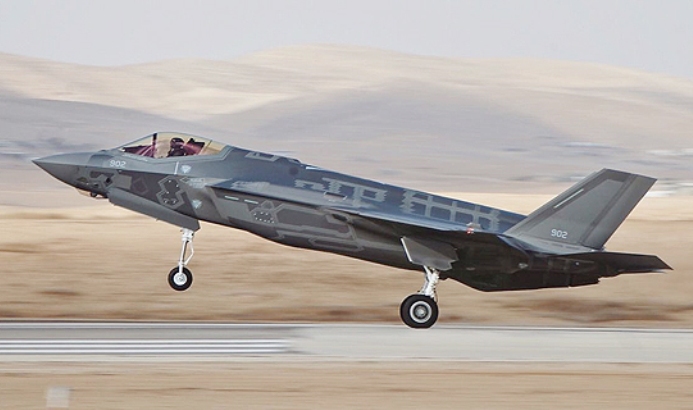“We are the first in the world to use the F-35 in operational activity,” including in Syrian strikes, Israel Air Force Commander Amikam Norkin said.
By: Aryeh Savir, World Israel News
Israel’s recently acquired F-35 “Adir” fighters are already operational and flying in missions, IAF Commander Major General Amikam Norkin revealed.
“We are the first in the world to use the F-35 in operational activity,” Norkin said on Tuesday while addressing 20 air force chiefs from around the world who are in Israel for an international three-day conference on international cooperation and regional stability.
“We attacked twice in the Middle East” with the F-35s, he stated. “The Israeli Air Force is a pioneer and a world leader in operating air power.”
The US-made, multi-role stealth fighter first arrived in Israel in December 2016. The first IAF F-35 squadron, dubbed the “Golden Eagle,” was declared operational in December 2017. It was the first outside of the US to be ready for a mission, preceded only by the US Marine Corps and US Air Force.
The fifth-generation fighter jet, manufactured by Lockheed Martin, is considered one of the world’s most advanced fighter aircraft.
Israel has acquired a total of 50 F-35s which are to be supplied by December 2024.
100 SAMs over the skies of Damascus
Norkin also revealed further details about the clash between Israel and Iran earlier this month in which Iran’s Quds forces launched a barrage of rockets at IDF bases on the Golan Heights in northern Israel, prompting an extensive IAF attack on dozens of Iranian targets in Syria.
The IAF commander said the Iranians fired 32 rockets at Israeli territory, while Israel’s defense systems intercepted four of them and the rest fell in Syrian territory.
More than 100 SAMs (Surface-to-air missiles) from SA-5, SA-17 and SA-22 batteries were fired at Israeli fighter planes while they were conducting their strikes against Iranian targets inside Syria, Norkin explained. In response, Israel destroyed their SAM batteries. All IAF aircraft returned to their airbases safely.
The Iranian attack caused no injuries or damage and was essentially a resounding failure, while the IDF said it set back Iran’s military buildup in Syria by “many months.”
“We checked what the Iranians were doing around us. Quds Force was based in the T-4 airbase [Syria’s Tyas airbase], 250 kilometers from Israel. From this base, they attempted to attack us using a UAV (Unmanned Aerial Vehicle) which infiltrated Israel a number of months ago [in February]. After this event, we saw that they continued to store munitions in this base, including aerial defense capabilities which we attacked this month,” Norkin told the visiting commanders.
“Over the past weeks, we understood that Iran was transporting long-range missiles and rockets to Syria, among which are ‘Uragan’ missile launchers that we attacked, just north of Damascus,” he added.
Sending a Message to Hezbollah
Norkin also reportedly showed the air force officers a photograph of the stealth fighter jet flying over the Lebanese capital of Beirut, sending a message to the Hezbollah terror group, whose headquarters are in the city.
As part of the convention, which also marks the Israeli Air Force’s 70th anniversary, air force commanders and senior officers from over 20 countries arrived in Israel. Among the countries participating are the US, UK, Germany, Canada, Greece, Poland, Italy, Cyprus, Austria, Bulgaria, Brazil, France, Czech Republic, Romania, Croatia, the Netherlands, Finland, Belgium, Vietnam and India.


